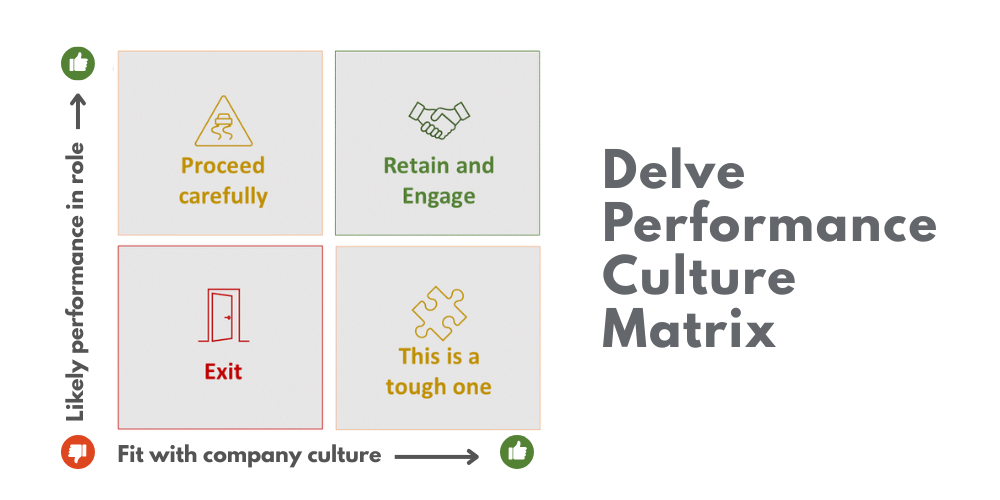Evaluate your team using Delve’s Performance | Culture Matrix and follow our tips for making the right calls on talent . . . thoughtfully, efficiently, and with care.
As a Founder/CEO, when you get a round of funding, you have some tough calls to make about how you spend that money, particularly related to your people.
Here’s how we know a client is working on this:
We get this message: “For the (insert CFO, CTO, CRO, or COO title), I’m going to talk to (insert name of loyal, long-term employee). Your thoughts?”
Our response: Let’s get on a call.
And then here’s what we say:
Now that you have this money, you need to spend it wisely. It’s very tempting to simply slot the people you currently have into the future jobs you need filled. But this is a high-risk approach.
You and your team are going places that, perhaps, none of you have ever imagined. Picture that you are on a small sailboat together. You are in choppy waters headed towards the open seas. To navigate this upcoming challenge, do you have the right crew onboard?
Size up the situation
Ideally, you will have people with you who a) are excellent at what they do, and b) embody the culture you want in your team. So, before you promote current employees into higher-level roles, take time to assess their potential to succeed using Delve’s Performance |Culture matrix.
For the purpose of this model, let’s agree to use the following definitions.
Culture: You worked hard to create your company’s culture. Treat it as a garden that needs tending. Ask yourself: Does this team member embody our values? Model the right behaviors?
Performance: Imagine this team member in a future-state role. How likely is this person to excel?
Plot your people and then decide if you:
- Retain and engage an employee who is likely to do well in their new role and who will evangelize and build your culture
- Proceed carefully with the employee who can get the job done but who is likely to erode the culture you have so very carefully built
- Move out anyone who is unlikely to succeed in a future (or current) role and who fails to embody your culture
- Make a tough call for the person who is a perfect complement to your culture, but whose skills are a better match for the job they used to have than the one you need them to do.
Making the Tough Call
Employees who fall into the “tough call” category are often your very favorite people. They have usually been with you from the beginning, are absolutely beloved by the team (and may be a relative or close friend)….and, unfortunately, aren’t skilled or experienced enough to easily step into a more challenging role.
Your investors are counting on you to get this right. Do you take a chance on promoting a “tough call employee,” leave them in their current role, or let them go?
If you decide to give this employee a chance in a challenging new role, it is your job as a leader to prepare them. Unless you are an expert in this space with the time and inclination to develop that person, you need another plan. Your best option may be to layer this person with an expert leader who can develop this person’s skills while taking the organization where it needs to go.
Nobody Wants to Hear They are Getting Layered
This will be one of the toughest conversations you will ever have. How do you prepare? Get clarity on what the higher-level job really looks like for an organization your size with your growth potential. Google the job title. Honestly assess your employee against these capabilities. Be clear on their strengths and gaps. Get your talking point in order. Then have a supportive but frank conversation.
Will this guarantee that you can keep the person happy in the organization? No, but this is a leadership moment you will face time and again. As CEO it is your job to optimize what’s best for the organization while supporting the people within it.
Moving Forward
Clients ask me all the time how to avoid this situation going forward. There’s no replacement for years of experience in a role, so you may face this again, but you — as a savvy CEO — should:
- Create a culture of development. Pay attention not only to what the person does now but where they can grow.
- Be clear on skills needed to thrive in an evolving role, and be brutally honest about the person’s ability to grow into that role
- Assign mentors — even from outside the company if needed
- Have people grow cross-functionally to build management muscle and expand career horizons
- Give leadership roles (without titles) to people by running special projects
- Give candid, clear, and actionable feedback on an ongoing basis
Will you need to make this call again? Probably… if you keep growing. As every experienced leader knows, the seas a start-up faces are always changing. Having the right people onboard will make it easier to navigate towards calmer waters.
Meet Your Featured Delve Experts

Blair Slaughter, PhD
Delve Founder & CEO


